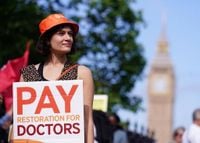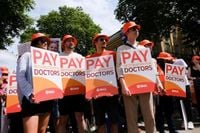Resident doctors in England are gearing up for a potential wave of strike action that could disrupt the National Health Service (NHS) for up to six months, following a decisive vote in favour of industrial action over pay. The British Medical Association (BMA) announced that 90% of voting resident doctors backed strikes, with a turnout of 55%, just surpassing the legal threshold required to take such action. This development threatens to undermine recent progress in the NHS and complicate government plans to reduce waiting lists and improve healthcare services.
Resident doctors, formerly known as junior doctors, are medical professionals undergoing postgraduate training to become consultants, general practitioners (GPs), or specialists. They represent about 25% of the UK's medical workforce, with approximately 77,000 working across England in hospitals, GP surgeries, and community settings. Despite having accepted a 22% pay rise over the past two years (2023-2025), these doctors argue that their salaries have suffered significant erosion in real terms since 2008, and are demanding a 29.2% pay increase to restore their earnings to former levels.
The BMA's call for a substantial pay uplift is based on the Retail Prices Index (RPI) inflation measure, which currently stands at 4.5%, reflecting the rising cost of living that has outpaced modest salary increases. Although resident doctors received a 5.4% pay rise for the current financial year, including a £750 consolidated payment, union leaders stress this is insufficient. BMA resident doctors committee co-chairs Dr Melissa Ryan and Dr Ross Nieuwoudt stated, "Doctors have spoken and spoken clearly: they won't accept that they are worth a fifth less than they were in 2008." They warn that the union's will to fight for fair pay remains strong and that strike planning is already underway.
Pay erosion has been a long-standing issue. Since 2008, doctors' real-term pay has declined by approximately 23%, according to the BMA. The union highlights that, even with recent increases, wages remain about 20% lower in real terms than they were 17 years ago. This decline is particularly concerning given that resident doctors often work demanding hours, including nights and weekends, and carry a heavy workload within the NHS, managing hospital wards and outpatient clinics.
Salary details for resident doctors vary by training stage. Foundation trainees earn between £36,616 and £42,008 annually, while those starting specialist training can expect between £49,909 and £70,425. Specialty doctors earn between £59,175 and £95,400, and specialist grade doctors make between £96,990 and £107,155. Consultants, who are senior doctors with additional responsibilities, earn between £105,504 and £139,882, with opportunities to supplement income through private practice. Salaried GPs earn between £74,192 and £110,330, depending on experience and role.
The government's pay offer, deemed the highest across the public sector for two consecutive years, has been met with resistance from the BMA. Health Secretary Wes Streeting has made clear that reopening pay negotiations is off the table, citing fiscal constraints and fairness to other NHS workers. Streeting warned doctors that "the public will not forgive you" if strike action proceeds, emphasizing that less than half of resident doctors actually voted for industrial action. He urged the BMA to reconsider, stating, "Patients do not support the proposed strike action and it doesn't even command majority support among BMA resident doctors."
Downing Street echoed this stance, with a spokesperson stating, "The NHS is finally moving in the right direction for the first time in 15 years, so it's disappointing that the BMA is threatening to undermine that progress with strikes." They reiterated that the government "can't be more generous" than it already has been regarding pay rises this year.
Despite government resistance, the BMA insists there is still time to avert strikes if the government presents a credible path to pay restoration. The union has pledged to seek fresh talks before announcing strike dates, but the ballot result gives them a mandate to call strikes until January 2026. This looming industrial action raises concerns about the impact on NHS services, with previous strikes causing the postponement of approximately 1.5 million appointments, operations, and procedures.
Sir Keir Starmer's Labour government has recently unveiled a ten-year plan aiming to see 92% of patients within 18 weeks for routine hospital treatments by July 2029. Current waiting lists for routine hospital treatment in England stand at an estimated 7.39 million, the lowest in two years. However, potential strikes threaten to derail these improvements, risking significant delays and cancellations that could leave patients in pain or discomfort.
Danny Mortimer, chief executive of NHS Employers, expressed concern, saying, "Resident doctors voting for more industrial action after the largest series of pay awards in the public sector is a troubling development. Further strikes are the last thing health leaders wanted and could result in tens, if not hundreds, of thousands of operations and procedures being delayed or cancelled." Hospital consultants and specialist doctors are also due to ballot for industrial action, potentially compounding the disruption.
The threat of strike action is also linked to a worrying trend of doctors considering leaving the NHS. A 2022 BMA survey found that four out of ten resident doctors planned to leave as soon as possible, with a third intending to work abroad within the next year. The General Medical Council's 2024 survey revealed that 30% of doctors were likely to relocate overseas, driven by better pay and working conditions. In 2023, around 4,000 doctors relinquished their licenses or left the medical register, citing overseas opportunities as a key reason.
These departures deepen the NHS workforce crisis, already strained by years of underfunding and high demand. The BMA warns that without meaningful pay restoration and improved working conditions, the NHS will continue to lose valuable medical talent, exacerbating pressures on patient care.
Both the BMA and government agree on the need to improve working conditions, but with pay negotiations stalled, the dispute remains unresolved. The coming months will be critical as resident doctors prepare for possible strike action, and the government grapples with balancing fiscal responsibility against the urgent need to sustain a motivated and adequately compensated medical workforce.





